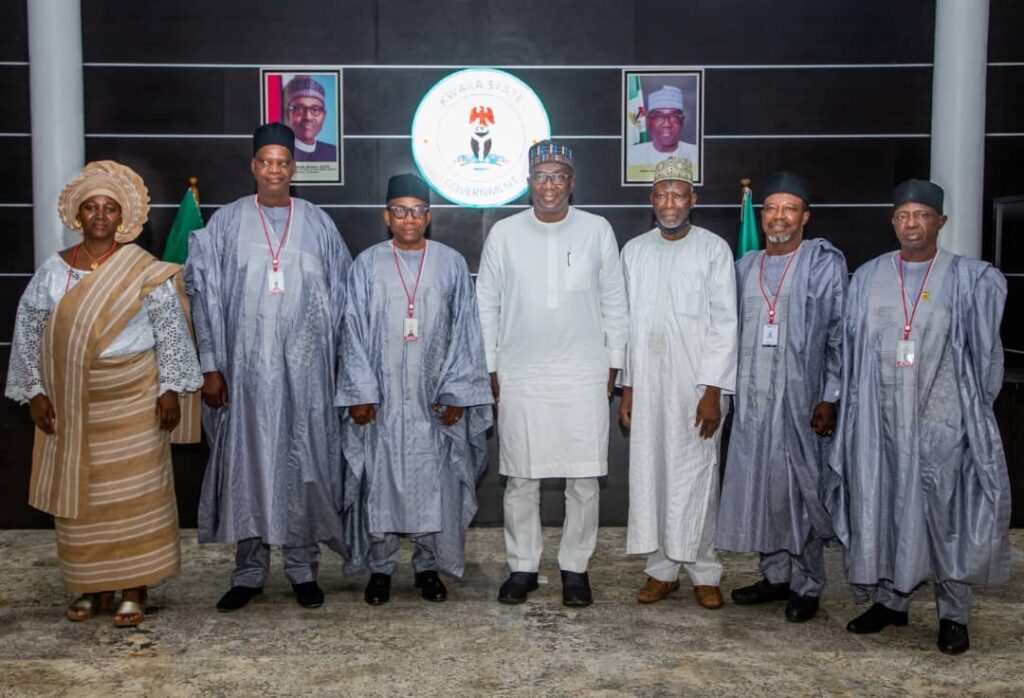Faculty members and participants of Course 15 of the National Institute for Security Studies on Monday began a week-long study tour of Kwara State, with Governor Abdulrahman Abdulrazaq giving the delegation a blow-by-blow account of socioeconomic, security and environmental issues affecting the state.
During the delegation’s courtesy visit to Government House Ilorin, the Governor held them spellbound with his mastery of myriad issues of deforestation and flooding, oil and gas and cleaner energy; poverty and social investment programme of the administration; infrastructural deficits and ongoing efforts to bridge the gap; mining, agribusiness, climate change, transhumance, grazing reserves, and herders-farmers’ crisis; and activities of non-state actors and the efforts of his administration to deny them a toehold in Kwara, among other national security issues.
The discussion with the delegation was held off-camera because of its connection to national security.
Faculty Team Lead of NISS Course 15 Emmanuel Esomonu, who led a standing ovation for Abdulrazaq, described the rare insights offered by the Governor on the issues as truly eye-opening and overwhelming, adding: “This goes to show how truly prepared and knowledgeable you are for this important office, Your Excellency.”
The participants, who comprise top security officers and high-ranking public servants, are on a tour of Kwara as part of their 10-month course in the institute, leading to the award of Fellow of Security Institute (FSI).
The theme of the study tour is ‘Global Climate Change Challenge: Prospects and Priorities for Economic Development and Conflict Resolutions in Africa.’
Earlier at the opening lecture in Ilorin, the Kwara State capital, Secretary to the State Government Prof Mamman Saba Jubril said the theme of the study tour is upfront and bear relevance to the quest for providing and fostering possible climate solution for economic benefits, improving lives and protecting the environment.
“Let me use this auspicious opportunity to commend and appreciate the leadership and participants of Environmental Study Tour of Kwara State for making the right choice of Kwara State with its unique ambiance as adequately suitable for the theme of the study tour,” he said.
“We are indeed proud of the theme of this study tour:” The Global Climate Change Challenge: Prospects and Priorities for Economic Development and Conflict Resolutions in Africa. This theme could not have come anytime better than now, when climate change is threatening our economic prosperity and life sustainability.”
Jubril assured the participants that various strategies have been mapped out to harvest and harness relevant information on the theme for the good of the generality of the populace.
“I urge the faculty members and participants to feel at home to interact with our people who are quite accommodating, friendly and hospitable,” the SSG advised.
Head of the delegation and Syndicate Supervisor Emmanuel Esomonu, for his part, said the team is seeking to know how the state government is tackling the issue climate challenge such as deforestation and other ecological problems that confront the state.
“This syndicate three is one out of the five syndicates that make up this year’s course. Other syndicates are in other parts of the north undergoing the same tour. At the beginning of every year, the management of the Institute selects a topic of study. This year’s topic is ‘The Global Climate Change Challenge: Prospects and Priorities for Economic Development and Conflict Resolutions in Africa.’
“We will be interested in how the state government is tackling the issue climate challenge in the state with particular reference to issues of farmers-herders clashes, deforestation and other ecological problems that confront the state,” he said.
“It is hoped that in the one week that we will be staying here, we will gather enough to assist the participants to deepen their knowledge in this area of knowledge.”
A research fellow in the Institute Veronica Joshua explained that the course fosters interagency synergy and international cooperation among the participants as well as helps in addressing the ever-dynamic complex security challenges in their respective countries.
“As part of the requirements for FSI, the participants undertake local, state, regional and world study tours to interrogate the topic,” she said.
This courtesy visit is to fulfill the study requirements and findings of the tour would be made available to the state and federal government for good governance.”
